 Search by Keyword
Sign Up Below for our MONTHLY BEATLES TRIVIA QUIZ!
|
 German picture sleeve
|
"KOMM, GIB MIR DEINE HAND"
(John Lennon - Paul McCartney - J. Nicolas - Hellmer)
 To outsiders, every step on The Beatles' ladder to success seemed effortless. Their rise to fame appeared instantaneous, but on the contrary, much hard work and conscious thought went into every move. With manager Brian Epstein, producer George Martin and publisher Dick James behind the scenes, strategic steps were taken all along the way. To outsiders, every step on The Beatles' ladder to success seemed effortless. Their rise to fame appeared instantaneous, but on the contrary, much hard work and conscious thought went into every move. With manager Brian Epstein, producer George Martin and publisher Dick James behind the scenes, strategic steps were taken all along the way.
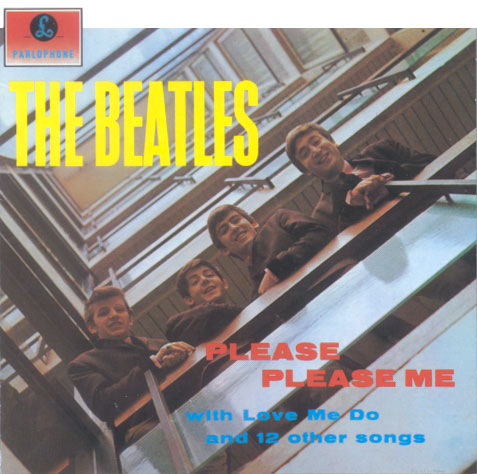 For instance, by November of 1963, they had totally conquered Britain as evidenced by three #1 singles as well as having their first album "Please Please Me" permanently lodged in the #1 spot on the albums charts. They played the prestigious London Palladium and even performed at the Royal Command Performance. As far as conquering other countries, they had already taken on Sweden with a highly successful tour and plans were well under way to tour France in January and America in February of 1964. For instance, by November of 1963, they had totally conquered Britain as evidenced by three #1 singles as well as having their first album "Please Please Me" permanently lodged in the #1 spot on the albums charts. They played the prestigious London Palladium and even performed at the Royal Command Performance. As far as conquering other countries, they had already taken on Sweden with a highly successful tour and plans were well under way to tour France in January and America in February of 1964.
 They all had aspirations of furthering their conquest throughout the world, but one major setback appeared to be the language barrier. "The German record company's head of A&R had told me that The Beatles would never sell records in Germany unless they actually sang in German," George Martin explains. "I was disinclined to believe this, but that's what he said and I told The Beatles. They laughed: 'That's absolute rubbish.' So I said, 'Well, if we want to sell records in Germany, that's what we've got to do.' So they agreed to record in German. I mean, really it was rubbish." They all had aspirations of furthering their conquest throughout the world, but one major setback appeared to be the language barrier. "The German record company's head of A&R had told me that The Beatles would never sell records in Germany unless they actually sang in German," George Martin explains. "I was disinclined to believe this, but that's what he said and I told The Beatles. They laughed: 'That's absolute rubbish.' So I said, 'Well, if we want to sell records in Germany, that's what we've got to do.' So they agreed to record in German. I mean, really it was rubbish."
 At the time, English speaking acts did need to cater to the language barrier somewhat to sell records. Recording artists had to record foreign language versions of their hits for those markets, such as "Wer kennt den Weg" ("I Walk The Line") by Johnny Cash. In fact, the first commercially available Beatles recording was "My Bonnie," which made the top five in Germany with a German-language introduction sung by lead singer Tony Sheridan. So EMI's West German division, Electrola Gesellschaft, wasn't out of line to ask for The Beatles to record German versions of their recent hits for release in that country on their Odeon label. At the time, English speaking acts did need to cater to the language barrier somewhat to sell records. Recording artists had to record foreign language versions of their hits for those markets, such as "Wer kennt den Weg" ("I Walk The Line") by Johnny Cash. In fact, the first commercially available Beatles recording was "My Bonnie," which made the top five in Germany with a German-language introduction sung by lead singer Tony Sheridan. So EMI's West German division, Electrola Gesellschaft, wasn't out of line to ask for The Beatles to record German versions of their recent hits for release in that country on their Odeon label.
As it happened, while they were attempting to conquer France (staying at the George V Hotel in Paris while on tour there), they agreed to record "I Want To Hold Your Hand" as well as "She Loves You" in German. But not without second thoughts.
Songwriting History
 "Odeon sent over a translator from Cologne to coach the boys," George Martin continues, "although they did know a little German from having played there." The man that was sent over was not just a translator. His name was Camillo Felgen, who happened to be a very popular singer, lyricist and television / radio presenter in Germany and France. "Odeon sent over a translator from Cologne to coach the boys," George Martin continues, "although they did know a little German from having played there." The man that was sent over was not just a translator. His name was Camillo Felgen, who happened to be a very popular singer, lyricist and television / radio presenter in Germany and France.
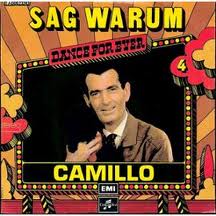 After starting his career as a teacher, Camillo Felgen first became a translator for the German occupiers during World War II. After studying theater and opera, he joined Radio Luxembourg as a chorus singer and, in 1951, had his first international hit song with "Bonjour les amies" ("Hello Friends"). In 1953 he recorded his first German language recording "Onkel Toms Altes Boot" ("Uncle Tom's Old Boat"). In 1959 he also had a hit record with "Sag Warum," which was based on a melody by Phil Spector. After starting his career as a teacher, Camillo Felgen first became a translator for the German occupiers during World War II. After studying theater and opera, he joined Radio Luxembourg as a chorus singer and, in 1951, had his first international hit song with "Bonjour les amies" ("Hello Friends"). In 1953 he recorded his first German language recording "Onkel Toms Altes Boot" ("Uncle Tom's Old Boat"). In 1959 he also had a hit record with "Sag Warum," which was based on a melody by Phil Spector.
Also among his credentials are two entries in the Eurovision Song Contest, the first in 1960 where he finished last with "So laang we's du do bast," and then in 1962 where he came in third with "Petit Bonhomme" sung in French, which also landed him a hit song.
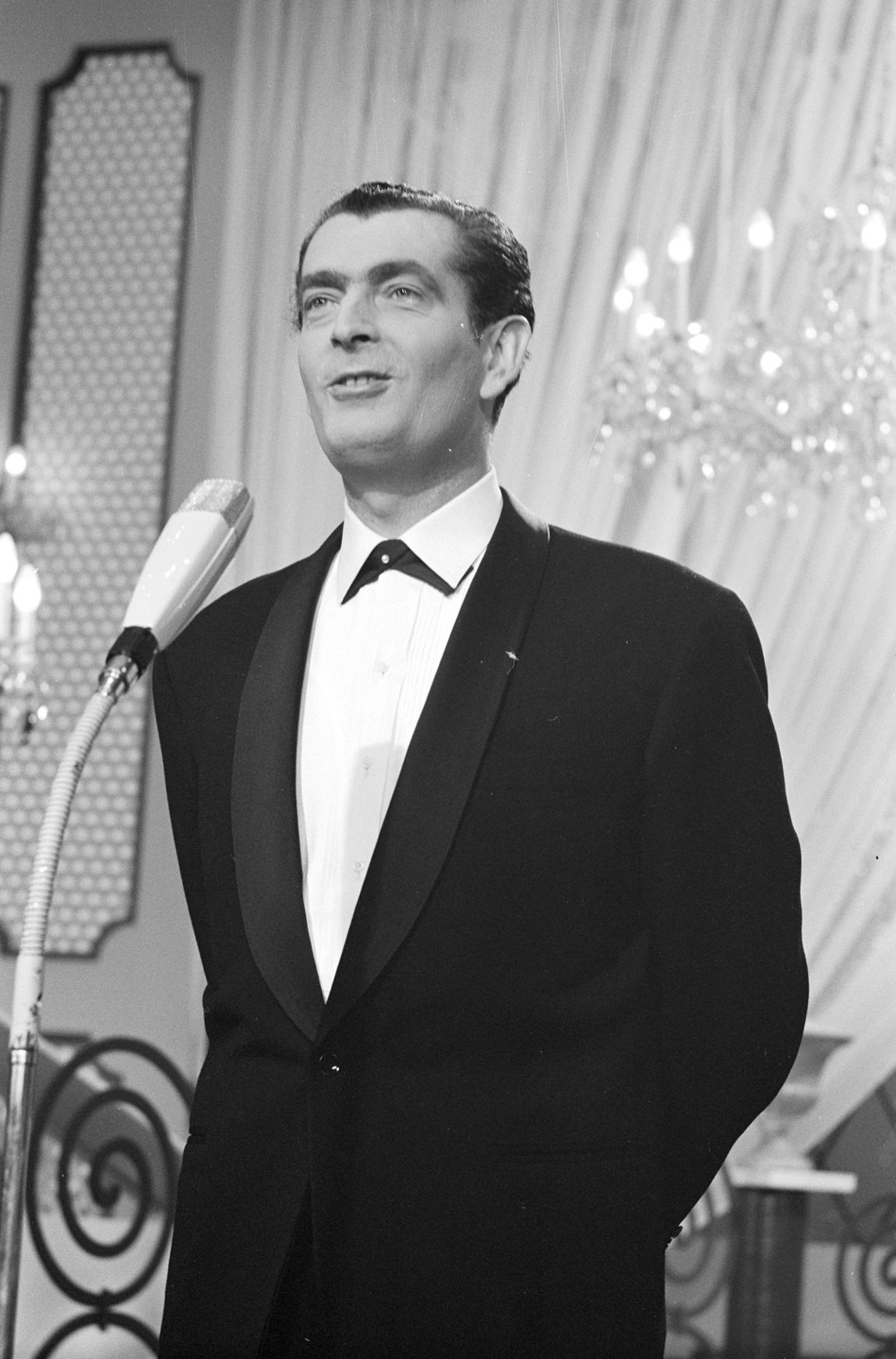 On January 28th, 1964, Camillo Felgen was working as a program director at Radio Luxembourg when he got a desperate call from Otto Demmlar, EMI's German producer, asking him to provide English to German translations of two of The Beatles most popular songs at that time. Not only that, but Otto Demmlar asked him to fly over to Paris where The Beatles were on tour to coach them to phonetically pronounce the lyrics properly during a recording session. And, to top it all off, he had less than 24 hours to get the translations completed and be there for the recording session. On January 28th, 1964, Camillo Felgen was working as a program director at Radio Luxembourg when he got a desperate call from Otto Demmlar, EMI's German producer, asking him to provide English to German translations of two of The Beatles most popular songs at that time. Not only that, but Otto Demmlar asked him to fly over to Paris where The Beatles were on tour to coach them to phonetically pronounce the lyrics properly during a recording session. And, to top it all off, he had less than 24 hours to get the translations completed and be there for the recording session.
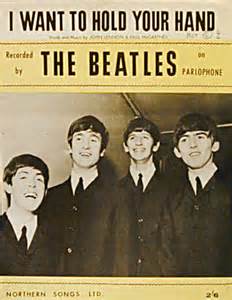 Camillo Felgen was up to the task and was immediately flown to Paris to meet with George Martin and eventually The Beatles. Although the actual song was written in September of 1963, the German translation was completed by January 29th, 1964, which was the date of the scheduled studio session in Paris. "I Want To Hold Your Hand" was transcribed as "Komm, Gib Mir Deine Hand," which litterally means "Come, give me your hand." Camillo Felgen decided to use an alias for his songwriting credit, choosing J. Nicolas from his middle names (His full name was Camillo Jean Nicolas Felgen). Camillo Felgen was up to the task and was immediately flown to Paris to meet with George Martin and eventually The Beatles. Although the actual song was written in September of 1963, the German translation was completed by January 29th, 1964, which was the date of the scheduled studio session in Paris. "I Want To Hold Your Hand" was transcribed as "Komm, Gib Mir Deine Hand," which litterally means "Come, give me your hand." Camillo Felgen decided to use an alias for his songwriting credit, choosing J. Nicolas from his middle names (His full name was Camillo Jean Nicolas Felgen).
 After continuing his singing and songwriting career, even writing for Connie Francis, he hosted a successful game show in Germany in the '70s called "Spiele ohne Grenzen" as well as owning a small chain of fashion stores. At 84 years of age, Camillo Felgen passed away on July 16th, 2005 in Esch-sur-Alzette. After continuing his singing and songwriting career, even writing for Connie Francis, he hosted a successful game show in Germany in the '70s called "Spiele ohne Grenzen" as well as owning a small chain of fashion stores. At 84 years of age, Camillo Felgen passed away on July 16th, 2005 in Esch-sur-Alzette.
 Although credited as a contributing songwriter on a Beatles song, his name fails to appear on most of the available releases. The original German release of the single attributes the songwriting credit to "Lennon / McCartney / Nicolas / Hellmer," as does the American Capitol album "Something New." The British "Rarities" album, which was the song's first release in their home country, simply credits the song to "Lennon / McCartney." As for current releases, the 2009 remastered "Past Masters" booklet doesn't mention songwriters at all. As a result, Camillo Felgen (aka J. Nicolas) appears to be the most obscure songwriter in The Beatles cannon. Although credited as a contributing songwriter on a Beatles song, his name fails to appear on most of the available releases. The original German release of the single attributes the songwriting credit to "Lennon / McCartney / Nicolas / Hellmer," as does the American Capitol album "Something New." The British "Rarities" album, which was the song's first release in their home country, simply credits the song to "Lennon / McCartney." As for current releases, the 2009 remastered "Past Masters" booklet doesn't mention songwriters at all. As a result, Camillo Felgen (aka J. Nicolas) appears to be the most obscure songwriter in The Beatles cannon.
 Or is he? What about the name "Hellmer" which graces the songwriting credits on the original releases of the song? No information seems to exist as to his identity. Since George Martin mistakenly identified EMI's German producer Otto Demmlar as the translator that was sent to Paris in 1964 when doing an interview that was used in the "Anthology" book, could Otto Demmlar have used "Hellmer" as an alias? Or did Camillo Felgen commission help in translating the songs into German by someone named "Hellmer"? There's something for the mystery books. Or is he? What about the name "Hellmer" which graces the songwriting credits on the original releases of the song? No information seems to exist as to his identity. Since George Martin mistakenly identified EMI's German producer Otto Demmlar as the translator that was sent to Paris in 1964 when doing an interview that was used in the "Anthology" book, could Otto Demmlar have used "Hellmer" as an alias? Or did Camillo Felgen commission help in translating the songs into German by someone named "Hellmer"? There's something for the mystery books.
Recording History
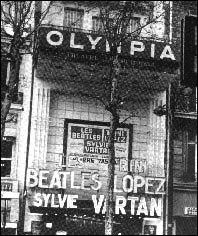 "While they were in Paris, appearing at the Olympia, I arranged for them to record at the EMI studios outside Paris," explains George Martin. "I had asked them to appear at the EMI Studios one afternoon and I got there with this German fellow (Camillo Felgen), who came to coach them with this language and when the time came, I think it was four o'clock, there was no sign of them, at all! I was a bit puzzled by this, and thought, 'I wonder what has happened to them?' "While they were in Paris, appearing at the Olympia, I arranged for them to record at the EMI studios outside Paris," explains George Martin. "I had asked them to appear at the EMI Studios one afternoon and I got there with this German fellow (Camillo Felgen), who came to coach them with this language and when the time came, I think it was four o'clock, there was no sign of them, at all! I was a bit puzzled by this, and thought, 'I wonder what has happened to them?'
 "So I rang their hotel and I spoke to (road manager) Neil Aspinall, and he said, 'Oh, they are having tea. They're not going to come.' And so I said, 'But, why?' And he said, 'Well, they don't want to. They've decided they don't want to make a record in German, after all.' I was absolutely livid! So, I hopped in a cab, together with (Camillo Felgen), and I tore to the George V Hotel and I burst in on the scene and they were all having tea there, the four Beatles, the two road managers, and the only woman present was Jane Asher. It was rather like the Mad Hatter's tea party in Alice In Wonderland because Jane was pouring tea from a China tea pot with her long gold hair and the others sitting round, rather like March Hare. "So I rang their hotel and I spoke to (road manager) Neil Aspinall, and he said, 'Oh, they are having tea. They're not going to come.' And so I said, 'But, why?' And he said, 'Well, they don't want to. They've decided they don't want to make a record in German, after all.' I was absolutely livid! So, I hopped in a cab, together with (Camillo Felgen), and I tore to the George V Hotel and I burst in on the scene and they were all having tea there, the four Beatles, the two road managers, and the only woman present was Jane Asher. It was rather like the Mad Hatter's tea party in Alice In Wonderland because Jane was pouring tea from a China tea pot with her long gold hair and the others sitting round, rather like March Hare.
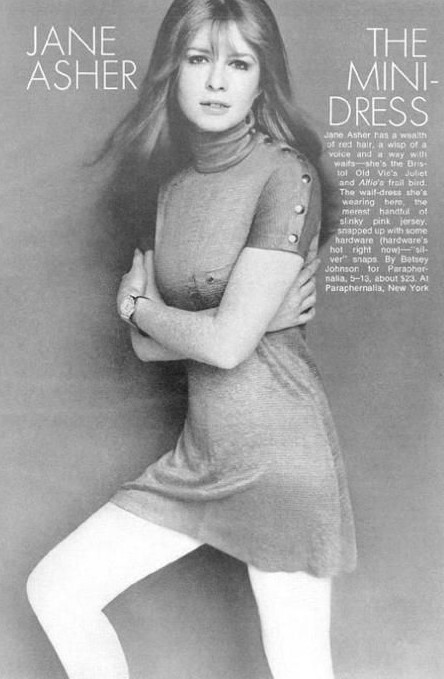 "As I burst into the room, and yelled at them, they all fled to corners of the room. The place disintegrated. There wasn't anyone left at the table except Jane Asher pouring tea. The four mops were in each corner of the room, just looking over a cushion, or a chair, pretending to hide, and laughing...one put a lampshade over his head. Then from behind the sofa and chairs came of chorus of: 'Sorry George, sorry George, sorry George...' I had to laugh. I said, 'You are bastards, aren't you? Are you going to apologize to (Camillo)?...And they, in their cheeky Liverpool way, said, 'Oh, sorry, so sorry!' "As I burst into the room, and yelled at them, they all fled to corners of the room. The place disintegrated. There wasn't anyone left at the table except Jane Asher pouring tea. The four mops were in each corner of the room, just looking over a cushion, or a chair, pretending to hide, and laughing...one put a lampshade over his head. Then from behind the sofa and chairs came of chorus of: 'Sorry George, sorry George, sorry George...' I had to laugh. I said, 'You are bastards, aren't you? Are you going to apologize to (Camillo)?...And they, in their cheeky Liverpool way, said, 'Oh, sorry, so sorry!'
"After that, they came and did the German record in the studio. They still didn't like doing it very much, but they did it. That was the very first time I had a row with them, and probably the only time."
 EMI Pathe Marconi Studios in Paris was the scene for the ensuing German recording session. "I found the studio very odd to work in," engineer Norman Smith recalls, "the equipment was alien to anything we were used to." With Camillo Felgen coaching them, The Beatles went through eleven takes of adding German vocals to the existing backing rhythm track of "I Want To Hold Your Hand" that was brought over from England, which was originally recorded on October 17th, 1963. EMI Pathe Marconi Studios in Paris was the scene for the ensuing German recording session. "I found the studio very odd to work in," engineer Norman Smith recalls, "the equipment was alien to anything we were used to." With Camillo Felgen coaching them, The Beatles went through eleven takes of adding German vocals to the existing backing rhythm track of "I Want To Hold Your Hand" that was brought over from England, which was originally recorded on October 17th, 1963.
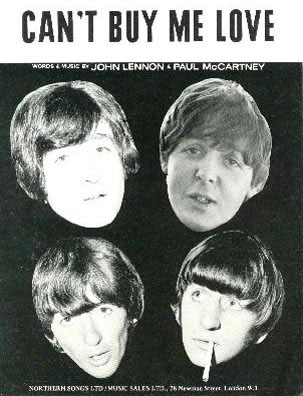 "Take five" and "take seven" were found to be suitable and were apparently edited together on this day. They also overdubbed handclaps to this edited take, since the original handclaps were not contained on the rhythm track. After this was complete, they worked on the German version of "She Loves You" and, with studio time left to spare, they started work on a new composition "Can't Buy Me Love." Having finished the German songs in one day, they could cancel the session that was booked for January 31st, which meant Camillo Felgen was gratefully free to fly back home. "Take five" and "take seven" were found to be suitable and were apparently edited together on this day. They also overdubbed handclaps to this edited take, since the original handclaps were not contained on the rhythm track. After this was complete, they worked on the German version of "She Loves You" and, with studio time left to spare, they started work on a new composition "Can't Buy Me Love." Having finished the German songs in one day, they could cancel the session that was booked for January 31st, which meant Camillo Felgen was gratefully free to fly back home.
Since the first release of the song was the German single that came out on February 4th, 1964, EMI staff must have made a quick mono mix of the song right away, probably at the end of the recording session on January 29th. No records are available to confirm this but, since the single was released that quickly, it must have happened.
 Back in London, on March 10th, 1964, George Martin, Norman Smith and an unknown 2nd engineer, made the second mono mix of "Komm, Gib Mir Deine Hand" in EMI Studio Two. The stereo mix was done two days later, on March 12th, 1964 in the EMI Studio Three control room by George Martin and Norman Smith. Because the stereo mix was done with the rhythm track entirely on one side and the vocals/handclaps on the other, you can hear some brief talking at the beginning, sounding like the word "coming." Tape copies were made of the stereo mix, which was equalized, compressed and with added echo, to be sent to Germany and the US, if they saw fit to release it. Back in London, on March 10th, 1964, George Martin, Norman Smith and an unknown 2nd engineer, made the second mono mix of "Komm, Gib Mir Deine Hand" in EMI Studio Two. The stereo mix was done two days later, on March 12th, 1964 in the EMI Studio Three control room by George Martin and Norman Smith. Because the stereo mix was done with the rhythm track entirely on one side and the vocals/handclaps on the other, you can hear some brief talking at the beginning, sounding like the word "coming." Tape copies were made of the stereo mix, which was equalized, compressed and with added echo, to be sent to Germany and the US, if they saw fit to release it.
 A later mix was made in preparation for the initial compact disc release of the song on the 1988 album "Past Masters, Volume One." This mix appears to be a simple panning of the left and right channels in order the blend the separation. Later, when the remastered combined double-disc "Past Masters" came out in 2009, the stereo mix made on March 12th, 1964 was restored for posterity's sake. A later mix was made in preparation for the initial compact disc release of the song on the 1988 album "Past Masters, Volume One." This mix appears to be a simple panning of the left and right channels in order the blend the separation. Later, when the remastered combined double-disc "Past Masters" came out in 2009, the stereo mix made on March 12th, 1964 was restored for posterity's sake.
Song Structure and Style
 Although The Beatles didn't want to be bothered re-recording the song in German, they ended up being quite cooperative. "They weren't graceless," stated George Martin, "they did a good job." Their enunciation was impeccable while their harmonies were spot-on. It actually appears as if they were enthusiastic to make this recording. Their desire to conquer Germany must have outweighed their initial reluctance. If this was what it took to extend their fame, they ended up willing. Although The Beatles didn't want to be bothered re-recording the song in German, they ended up being quite cooperative. "They weren't graceless," stated George Martin, "they did a good job." Their enunciation was impeccable while their harmonies were spot-on. It actually appears as if they were enthusiastic to make this recording. Their desire to conquer Germany must have outweighed their initial reluctance. If this was what it took to extend their fame, they ended up willing.
(As for the complete "Song Structure and Style" of this track, please see "I Want To Hold Your Hand.")
American Releases
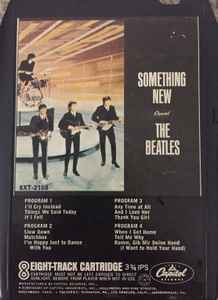 In order to fill out another American album, Capitol Records were more than happy to include "Komm, Gib Mir Deine Hand" as a novelty-type curiosity. Therefore, US audiences got to hear the song fourteen years before Britain did as it was featured on the July 20th, 1964 album "Something New." Somewhat misleadingly, the back of the album jacket referred to the song as "one of the most popular" new offerings from the Lennon / McCartney songbook. This album was released on an individual compact disc on January 21st, 2014, both the mono and stereo versions being contained on one CD. In order to fill out another American album, Capitol Records were more than happy to include "Komm, Gib Mir Deine Hand" as a novelty-type curiosity. Therefore, US audiences got to hear the song fourteen years before Britain did as it was featured on the July 20th, 1964 album "Something New." Somewhat misleadingly, the back of the album jacket referred to the song as "one of the most popular" new offerings from the Lennon / McCartney songbook. This album was released on an individual compact disc on January 21st, 2014, both the mono and stereo versions being contained on one CD.
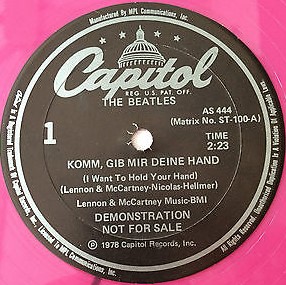 In 1978, Capitol thought to release a 12" single of "Komm, Gib Mir Deine Hand" with "Sie Liebt Dich" on the b-side on colored vinyl, available in both red and pink. This single was not made available for general distribution but included the words in all caps "Demonstration Not For Sale" on the label. In 1978, Capitol thought to release a 12" single of "Komm, Gib Mir Deine Hand" with "Sie Liebt Dich" on the b-side on colored vinyl, available in both red and pink. This single was not made available for general distribution but included the words in all caps "Demonstration Not For Sale" on the label.
March 7th, 1988 saw the compact disc release of the song on "Past Masters, Volume One." This "very narrow stereo" mix attempted to balance out the total separation of the stereo mix George Martin made on March 2nd, 1964. This album was combined with its companian "Past Masters, Volume Two" for a double-vinyl set that was released on October 24th, 1988. When this combined set was remastered and released on CD on September 9th, 2009 (the remasterd vinyl set coming out on November 12th, 2012), the original separated stereo mix was restored.
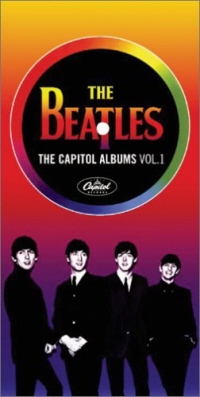 "Komm Gib Mir Deine Hand" could be found later on the box set "The Capitol Albums, Vol. 1" (originally released on November 15th, 2004) and the remastered "Past Masters" double-disc. "Komm Gib Mir Deine Hand" could be found later on the box set "The Capitol Albums, Vol. 1" (originally released on November 15th, 2004) and the remastered "Past Masters" double-disc.
September 9th, 2009 was also the date of the release of the CD box set "The Beatles In Mono." The CD "Mono Masters" features a remastered version of the mono mix of "Komm, Gib Mir Deine Hand.." The vinyl edition of this box set was first released on September 9th, 2014.
Conclusion
OK, I know what you're thinking. Hearing "I Want To Hold Your Hand" sung in German doesn't do much for me either. It was an interesting curiosity in 1964, but today it sits lodged within the official Beatles cannon like a chip of cement amongst polished jewels.
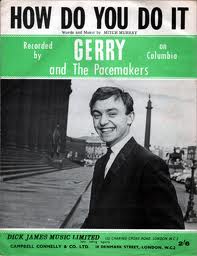 One thing that can be said is that the early Beatles put their whole heart and soul into whatever they were asked to do, even if it was against their better judgment. When George Martin insisted they record "How Do You Do It" with the intention of it being released as their first single, they argued against it but finally acquiesced. "They never shirked on jobs," stated George Martin. "They didn't really want to do it but in the end they did quite a good job." One thing that can be said is that the early Beatles put their whole heart and soul into whatever they were asked to do, even if it was against their better judgment. When George Martin insisted they record "How Do You Do It" with the intention of it being released as their first single, they argued against it but finally acquiesced. "They never shirked on jobs," stated George Martin. "They didn't really want to do it but in the end they did quite a good job."
The same can be said about "Komm, Gib Mir Deine Hand." So, every few years when you decide not to skip to the next track, take into account the fact that The Beatles were willing to do whatever it took to get them where they went, even if it ended up not being necessary.
Song Summary
"Komm, Gib Mir Deine Hand"
Written by: John Lennon / Paul McCartney / J. Nicolas / Hellmer
Instrumentation (most likely):
- John Lennon - Vocals, Rhythm Guitar (1958 Rickenbacker 325), Handclaps
- Paul McCartney - Vocals, Bass Guitar (1963 Hofner 500/1), Handclaps
- George Harrison - Lead Guitar (1962 Gretsch 6122 Country Gentleman), Handclaps
- Ringo Starr - Drums (1963 Ludwig Downbeat Black Oyster Pearl), Handclaps
Written and compiled by Dave Rybaczewski
German Citizenship and How Hamburg Germany Made The Beatles:
|
IF YOU WOULD LIKE TO MAKE A DONATION TO KEEP THIS WEBSITE UP AND RUNNING, PLEASE CLICK BELOW!
|